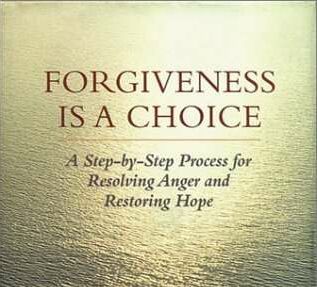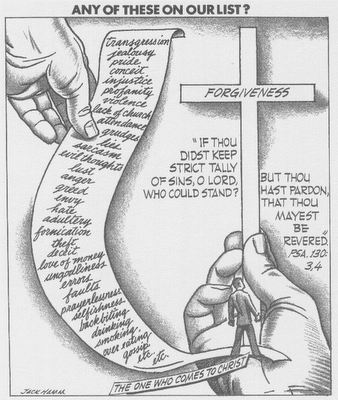1/18/2007
Ons land
A Beautiful World
 Below is a text about the Nicaragua project, which I wrote for Orkut.
Below is a text about the Nicaragua project, which I wrote for Orkut.I organised a youth exchange of 2 weeks in Nicaragua, with 10 youngsters from 16 to 22 years old. Most of them had never been out of Europe and certainly not to a development country. They like to talk about expensive cars, shops, and perfume and make-up. One voted for an extreme right-wing party (Wilders).
So it was a completely new experience for them to go to a poor country with broken roads, bad houses, a lot of sweat and dirt, hard work and primitive circumstances.It went well, it was difficult for them but they had a good time. Their efforts to conquer their difficulties were big. It took some time for me to realise how much the poverty strikes them, how hard they find it to live under these circumstances themselves and how much they are shocked by the poverty they see around them. For me it is not such a shock, I already knew it is like that, and I don't care to live like that myself for 2 weeks (or longer).
And this is why I want to organise these projects, to achieve that young people open up their minds and see that there is more in the world than their own lives in a small rich country like the Netherlands. I thought because they succeeded in overcoming their disgust and shock during these 2 weeks, it would make a change for them which would remain. But now one of the girls said: "I am too young for this experience, I cannot stand it. I will not go to a development country anymore. The next vacation I will stay in a 5 star hotel again. I want to believe a bit longer that the world is beautiful."
I was shocked to hear that. For me the island of Ometepe in Nicaragua is one of the most beautiful places in the world, with the beautiful nature, the friendly people, it is like a paradise. And do you want to go to a cold big concrete 5 star hotel then, in order to believe that the world is beautiful? I see so much more beauty with my projects in e.g. Nicaragua and Senegal.
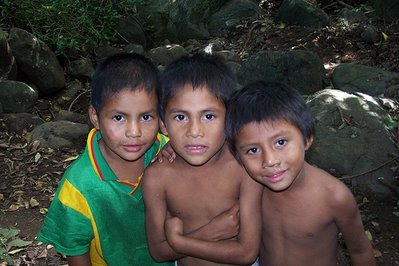 And how is that possible, to believe again that the world is only beautiful? Will she forget what she has seen on Ometepe, what touched her, the faces of the children, how heavy the work was, and how people do that their whole life? Will she forget that we could take a plane and travel to the other side of the world for adventure, to see something more of the world, and how the youngsters at Ometepe probably never get the chance for that. In a youth hostel on the main land it was the first time they saw the Internet. You know that a large part of the world is still like that, nothing will change by not looking at it.
And how is that possible, to believe again that the world is only beautiful? Will she forget what she has seen on Ometepe, what touched her, the faces of the children, how heavy the work was, and how people do that their whole life? Will she forget that we could take a plane and travel to the other side of the world for adventure, to see something more of the world, and how the youngsters at Ometepe probably never get the chance for that. In a youth hostel on the main land it was the first time they saw the Internet. You know that a large part of the world is still like that, nothing will change by not looking at it. My mother raised me with a strong sense of justice and a desire to do something against injustice. I have always known that there is a lot of poverty and injustice in the world, already before I had seen it with my own eyes. I always wanted to go to Africa and when I finally went there in 2001 I felt a relief. I feel happy when I can do something for a better world, also if it is something very small. You cannot be too young for that (what about children who are born in poor countries or in a civil war, what if they are too young to face that). It is strange also that I am often considered to be naive and too optimistic. As if I dream of a very beautiful world but that I deny the problems in the real world. Still I want to be in development countries as often as possible, to do what I can there. Somehow I don't deny the dark side of the world and I can stand it to be confronted with that.
But I won’t be angry with the girl that she decided to close her mind for poverty. She cannot help it that she feels like this, in the same way as I can't help how I feel either. It would be useless if I try to convince her of my point of view. And she is open and honest, to talk about it like this. But it touched me a lot, that she doesn't want to go to places like Ometepe because she wants to “believe a bit longer that the world is beautiful”.
Redouan says:
"Life should be beautiful; not the natural setting!.. there is the earth is beautiful anyway... the african Sahara, the Amazons, the Glaciers of Alaska, the prairies of Siberia... all are beautiful... but life is a seperate issue... life can not be beautiful unless people make it beautiful, regardless of the natural setting where it is happening! ... beautiful are people, the atmosphere, the happiness, beauty is optimism, beauty is dedication, friendship... and yes... a warm Cafe in the middle of a concrete jungle called Manhattan can be a far better display of the beauties of life than a fisherman's shack on the coast of Senegal... it is that simple... that little girl needed the luxury of five star hotel to restore her confidence in the existance of the good things in life, things that make our lives beautiful... not having to worry about money makes life beautiful... Champagne makes life beautiful... a loving partner makes life more beautiful than a million palm trees... a life we will probably only live once before we become nothing! That little girl was right... she had a shattered confidence in the beauty of life, after seeing the dispair in nation far away from her home... after experiancing a poverty that she had no role in creating... she had to make sure her life was not that... she had to make sure she still had it! We must enjoy life, rather than wasting our times finding out how others are living theirs... life is a once per human experiance, don't do anything with it except enjoying it... that's why I'll never travel to a Malaria infested African nation... I travel for joy... and I find joy on street side cafe in Rome, not on mosquito stricken hammack in a tribal tent somewhere in the Amazons!
If you are lucky enough to have a beautiful life, then you gotta grab it by the horns and enjoy every second of it and not try to make people feel guilty for something that is not their fault by making them experience the hell others are going through..."
My reaction:
"I agree that a feeling of guilt is useless. If people want to do some something for a better world then it should be out of a desire that comes from their heart, out of compassion, not because of feeling guilty.
And most people on Ometepe don't consider their lives as in hell, not at all, it is not only the nature that makes the place beautiful and good. For rich people it can look like hell, the bad roads, dirt, lack of education, lack of means, lack of health care. But life is not bad for the people who live on the island, they have enough to eat (although not varied enough), enough clothes and basic stuff. They lead a normal and often happy life. It all depends on how you look at this. I don't blame the girl for her decision, I accept and respect it. In fact I respect it more than what Redouan said. What the Dutch girl said showed that she was deeply touched by what she has seen in Nicaragua. She had her eyes wide open while she looked at the poverty, because she likes luxury so much her self, it was a big shock for her to see the poverty. She imagined in a very concrete way how it would be for her to live like the people on Ometepe. She looked the children in their eyes, the dirty faces, the children who are sick and could easily be cured if they would live somewhere else. The youngsters of her age and all the things she has and they don't have. Not that youngsters will always be more happy if they are as rich as the Dutch girl. Just that she finds these things important, so in her eyes the youngsters at Ometepe miss a lot. She was really touched and shocked and that is why it is difficult for her to go back to such a place now. She wants to protect herself against becoming cynical, becoming indifferent. She is wise that she realises this.
To say that you only want to enjoy life and that you don't care about the misery of others, if you are yourself not the direct cause of their misery, is something I find morally wrong and it is something totally different than to say that you want to help and that you care but that you pesonally can't stand to see the suffering right now."
1/06/2007
Christianity and forgiveness
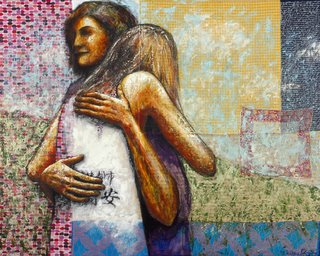 This time I would like to share another Orkut incident with you. It is a perfect example of how Levinas decribes the “killing the other” (in a non-literal way), a phenomenon which he strongly protests against and describes as immoral. It is about forgiveness.
This time I would like to share another Orkut incident with you. It is a perfect example of how Levinas decribes the “killing the other” (in a non-literal way), a phenomenon which he strongly protests against and describes as immoral. It is about forgiveness.(I will use some other names for the Orkuters for the anonymity.)
Ibrahim had insulted Brian, in a thread Brian had started in which he compares European politicians who receive Muslims "with open arms " in Europe, today, with “Quislings”. Quislings were collaborators with the Nazi’s in the Second World War (a ridiculous comparison). Brian said to me that Ibriham should take back his words within 20 minutes, or that I should ban him from the community otherwise. I said I would give him more time. In the mean time another Orkuter said that we "badly needed some lollipops to stop all the fighting there and make people sweet". Then Ibrahim said that he accepted the lollipop because it was so sweet. Then Brian complained that I didn’t ban Ibrahim although he didn’t take back his words.
I said that I thought there should be some forgiveness with Christmas (it was the 26st of December) and that Ibrahim had said something friendly at least...
So far so good for the silly fights in Orkut and talks about lollipops, which have nothing to do with real discussions. But then it becomes interesting, because Brian starts to put stickers on me, and thereby he treats me as an object instead of a human being with my own will and point of view.
Brian says to me: “Forgiveness is a Christian Western trait, Esther, and not suited for someone like you who hates all things western or Christian.”
He labels me as a West-hater and Christianity-hater. His logic is crazy, saying that forgiveness is a characteristic of Christianity and Western culture, as if it would be totally absent in anything non-Christian and non-Western, a ridiculous idea. Anyway, he labels me as anti-Western and anti-Christian. These labels don’t fit for me, being pro-moderate-Islam and choosing a non-Western side in some issues of international politics, doesn’t mean that I would hate the Western and Christian culture that I grew up with, which is part of me, and of which I appreciate many aspects. We have had discussions at Orkut for more than two years, Brian and me, he should know me better than that by now. And his way of reasoning is totally wrong. He comes to his conclusion without ever asking me anything, without listening to me. He treats me as an object, as if I cannot speak out for myself, and that’s how he has decided for me that it doesn't suit to be forgiving. By labeling me as anti-Western and anti-Christian, he reduces me to these categories, instead of treating me as a unique individual. He claims that for all people who belong to that category it is unsuitable to be forgiving. So he determines to which category I belong and he claims to know the characteristics of all people in that category. The logical conclusion is then that I have to have these characteristics as well: I cannot be forgiving.
And then it becomes even funnier, the discussion, because then he says that he considers himself somehow as a Christian, but that he disapproves of the concept of forgiveness.
He writes:
On Forgiveness
While I am an Agnostic, I consider myself a cultural Christian.
This concept came to me when I had an Indian roommate who was an atheist. He said that he loved his culture, but it was difficult to salvage the beauty in his culture while throwing out Hinduism. If he completely abandoned Hinduism, then he would be completely abandoning a culture which is to be proud of; not just the religion.
He came up with the concept that while he was spiritually an Atheist, he was culturally a Hindu.
I liked that idea.
I am spiritually Agnostic, but culturally Protestant (even though I have quite a few Jewish relatives).
Some parts of Christianity are very beautiful, but I have learned through life's hard lessons that they are not for me. One such thing is forgiveness. I very, very rarely allow myself to forgive people.
If a friend commits a trespass against you, you can never trust him again. Forgiveness is a lack of pattern recognition. If a friend steals from you or a girlfriend cheats on you, they have proven to you that they are capable of such things. Now you know that those actions are within the expected behaviors of that individual. You cannot logically forgive or forget the incident or you will likely find yourself in the same position of victimhood. Your guard must forever be up against such a person.
Forgiveness: This aspect of Christianity I reject.
How strange. Adopting the culture of Christianity but not the religion. Accepting some beautiful parts, but with no belief in God, choosing nice beautiful pleasant parts as if Christianity is a supermarket where you can choose whatever you like and leave the rest behind. You keep some cultural traditions but you skip the ethics mainly. “To respect my parents is ok but the “Thou shalt not kill” command doesn’t fit for me, I will skip that one ;). God probably doesn’t exist anyway so I don’t have to fear his punishment.”
Brian says that forgiveness is a lack of pattern recognition. He is right in that, however that is exactly what we should do: stop thinking in absolute generalized stereotyped patterns. Stop predicting future behaviour of the other, stop putting labels on him or her.
 To do the opposite, no dehumanization of the other, but to fully accept the other, to take my responsibility to listen to the appeal of the other, to try to understand the other, to care for the other, for that forgiveness is badly needed. We are not imprisoned in the past, the future is free and open. We can start today to create a new world. People make mistakes, that is only human. I have to build a bridge towards the other who is totally different from me. Only if I accept him totally as he is, with all the things I disapprove of, all the things he has done wrong, the harm he has done to me; only when I forgive him, can we go on together.
To do the opposite, no dehumanization of the other, but to fully accept the other, to take my responsibility to listen to the appeal of the other, to try to understand the other, to care for the other, for that forgiveness is badly needed. We are not imprisoned in the past, the future is free and open. We can start today to create a new world. People make mistakes, that is only human. I have to build a bridge towards the other who is totally different from me. Only if I accept him totally as he is, with all the things I disapprove of, all the things he has done wrong, the harm he has done to me; only when I forgive him, can we go on together.
On the other hand some things cannot and should not be forgiven. Levinas didn’t forgive Heidegger for becoming a Nazi. Only such extreme cases, where there is no recognition of the wrong and harm that has been done, no regret, no responsibility, no change for the better, then it might be impossible to forgive.
But you have to do something with the harm someone did to you, otherwise there is a big chance you will become embittered and cynical. You have to have a big heart and to open it for the other. If you show that you are willing to build a bridge to the other, then the chance is much bigger that the other will also be willing to build a bridge to you. And that is the road to goodness, love and peace, away from hate, violence and war.
When I speak like this I speak as a believer. In the same way as Levinas is a believer. He believes that God is infinite goodness. To follow God means to be good like him, to do your best to do good deeds, unconditionally. The other requests this from me. If I help the other, if I listen to his appeal, then I am good, a true follower of God. I should feed who is hungry, offer shelter to the homeless, take care of orphans, help strangers who are lost to find their way. If there is a typical Christian and Jewish moral then it is this. And of course I should be forgiving, and turn the other cheek. There are different ways in which you can consider the concept of Christianity, but I think it is impossible to consider these aspects as un-Christian, and it is impossible to skip these aspects and keep the rest. Brian said himself that forgiveness is a Christian trait. It is at the core of Christianity and it cannot be neglected. Like this it is the world totally upside down, to say that I would be a Christianity hater for whom it doesn’t suit to be forgiving and that Brian would be a cultural Christian who disapproves of forgiveness.
Forgiveness
by Luka Bloom
I open up my eyes
To the sunlight shining new
And in the dream that takes me back
A single word rings through
My memories awaken
To the horrors come to pass
One word in the morning light
Brings freedom home at last
Forgiveness...
For the ancient wounds still hurting
For the wrongs I've never known
For all the children left to die
Near fields where corn was grown
Like the ones who braved the ocean
In the fever sheds to burn
Let all the hatred leave these shores now
Never to return
When all the fighting is done
forgiveness
When all the blood has run
forgiveness
The opening fist
brings forgiveness
A wounded hand to kiss
forgiveness
It's the wonderdrug
it's the miracle cure
It could change our world
make our lives secure
I take my chance
at each abyss
and reach for my forgiveness
In the light of a new day
forgiveness
Together we grow
together we know
no losers no winners
in forgiveness
Together we're free
together we see
no right or no wrong
in forgiveness
Forgive me
I forgive you
1/02/2007
Geraakt en betrokken
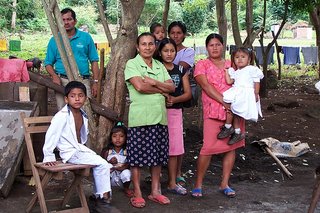 De onderstaande tekst heeft niet zoveel met Levinas te maken maar ik wil hem wel graag posten hier. Het is een artikel voor "De Uitgeester" over het Nicaragua project...
De onderstaande tekst heeft niet zoveel met Levinas te maken maar ik wil hem wel graag posten hier. Het is een artikel voor "De Uitgeester" over het Nicaragua project... Esther is 32 jaar en komt uit Uitgeest. Meer dan de helft van haar leven tot nu toe heeft ze in ons dorp doorgebracht. ‘Maar’, zegt Esther Langen, ‘ik wist al jong dat de wereld groter was dan mijn geboortedorp en dat ik die wereld wilde leren kennen. Ik wilde op avontuur gaan in een andere cultuur, en mensen ontmoeten die heel anders leven.’ Zo gezegd zo gedaan. Na afronding van haar studies sociologie en filosofie, reisde Esther naar Suriname, China, India, Fiji, Mali en Burkina Faso. Ze organiseerde vrijwilligersprojecten voor jongeren in Senegal en Tanzania. Ze is net terug van een bijzonder project in Nicaragua: een Xplore jongerenproject gericht op huizenbouw en het opzetten van kleine coöperaties op het eiland Ometepe. Van die reis doet zij verslag voor De Uitgeester. Begin 2006 besloot Esther Langen van haar hobby (het organiseren van internationale vrijwilligersprojecten) haar werk te maken. Haar eenmanszaak - Multi-Pass Multicultural Passage, www.multi-pass.nl – vraagt subsidies aan voor en organiseert jongerenprojecten. ‘Helemaal van een vreemde heb ik het niet. Wilma van Beek, mijn moeder, is een van de oprichters van Stichting Ometepe Project Nicaragua in Uitgeest. De oprichting van de stichting leek ons een mooie kans om de krachten te bundelen voor een vrijwilligersproject in Nicaragua. Via het programma Xplore (www.xplore.nl) vertrokken we half november met tien jongeren van het ROC van Amsterdam, ROC ASA Utrecht en de Vrije Universiteit naar Nicaragua. We hebben twee stenen huizen gebouwd in Las Cuchillas, een van de meest afgelegen bergdorpen op het eiland.’
Begin 2006 besloot Esther Langen van haar hobby (het organiseren van internationale vrijwilligersprojecten) haar werk te maken. Haar eenmanszaak - Multi-Pass Multicultural Passage, www.multi-pass.nl – vraagt subsidies aan voor en organiseert jongerenprojecten. ‘Helemaal van een vreemde heb ik het niet. Wilma van Beek, mijn moeder, is een van de oprichters van Stichting Ometepe Project Nicaragua in Uitgeest. De oprichting van de stichting leek ons een mooie kans om de krachten te bundelen voor een vrijwilligersproject in Nicaragua. Via het programma Xplore (www.xplore.nl) vertrokken we half november met tien jongeren van het ROC van Amsterdam, ROC ASA Utrecht en de Vrije Universiteit naar Nicaragua. We hebben twee stenen huizen gebouwd in Las Cuchillas, een van de meest afgelegen bergdorpen op het eiland.’
De projecten van Multi-Pass hebben meerdere kanten / doelen tegelijk. ‘Zo’n vrijwilligersproject is een mes dat aan twee kanten snijdt: aan de ene kant de resultaten die we bereiken in een ontwikkelingsland, en aan de andere kant de persoonlijke ervaring voor de jongeren die aan zo’n project deelnemen.
We hebben voor twee families huizen gebouwd, met z’n allen. Zij hoeven nu niet meer in een hut van stro en golfplaten te wonen, die nauwelijks beschutting biedt tegen regen en wind. In plaats daarvan wonen zij nu in een stenen huis met aparte kamers.’
 ‘Daarnaast hebben we samen met lokale jongeren die aan het project deelnamen een aantal sleutelfiguren van Ometepe geïnterviewd om te kijken wat de mogelijkheden zijn om één of enkele coöperaties op te zetten op het eiland. We spraken met o.a. de burgemeester, schoolhoofden en eigenaren van winkels en hotels. Door de afgelegen ligging van het eiland is de werkloosheid er erg hoog, en door het opzetten van coöperaties willen we dus de werkgelegenheid bevorderen. Het was een goed project, intensief en indrukwekkend.’
‘Daarnaast hebben we samen met lokale jongeren die aan het project deelnamen een aantal sleutelfiguren van Ometepe geïnterviewd om te kijken wat de mogelijkheden zijn om één of enkele coöperaties op te zetten op het eiland. We spraken met o.a. de burgemeester, schoolhoofden en eigenaren van winkels en hotels. Door de afgelegen ligging van het eiland is de werkloosheid er erg hoog, en door het opzetten van coöperaties willen we dus de werkgelegenheid bevorderen. Het was een goed project, intensief en indrukwekkend.’
Esther Langen en haar groep hopen dat zij op deze manier bereikt hebben dat mensen in o.a. Las Cuchillas in de toekomst aan het werk kunnen in een coöperatie, bijvoorbeeld een bakkerij, of als gids of als gastfamilie bij een coöperatie voor ecotoerisme. ‘Op deze manier blijft het traditionele karakter van het eiland behouden in plaats van dat het wordt aangetast door de flats en het grote geld van het massatoerisme. En alle opbrengsten van de coöperatie komen direct ten goede aan de lokale bevolking: door de extra banen en door de winst van de coöperatie te investeren in bijvoorbeeld de bouw van huizen en het kunnen betalen van leraren op de scholen en doktoren van de gezondheidspost.’
BLIKVERRUIMING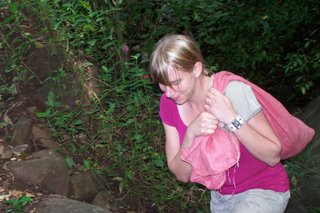 De tweede kant van het project is dat het jongeren aan het denken zet. De meeste van hen waren nog nooit buiten Europa geweest. Ontwikkelingssamenwerking was voor hen een “ver van mijn bed show”. Nu hebben ze aan den lijve ondervonden - letterlijk, met het stenen sjouwen - hoe mensen leven aan de andere kant van de wereld.
De tweede kant van het project is dat het jongeren aan het denken zet. De meeste van hen waren nog nooit buiten Europa geweest. Ontwikkelingssamenwerking was voor hen een “ver van mijn bed show”. Nu hebben ze aan den lijve ondervonden - letterlijk, met het stenen sjouwen - hoe mensen leven aan de andere kant van de wereld.
‘De belangrijkste voorwaarde voor een leefbare multiculturele samenleving is dat mensen elkaar, ongeacht hoe totaal anders de ander is, als gelijken behandelen. De verdeeldheid, het wij-zij denken, de onderlinge haat, het gevoel door de samenleving te worden uitgespuugd, maakt dat mensen elkaar gaan ontmenselijken.’
Concreet contact en samenwerken zijn de beste manier om ontmenselijking in de vorm van discriminatie en racisme tegen te gaan. Het belangrijkste in intercultureel contact is dat de relatie gebaseerd is op gelijkwaardigheid. Esther Langen: ‘Het is toch puur toeval dat wij in een rijk land zijn geboren en de Nicaraguanen in een arm land. En hoeveel beschaving hebben de “verlichting” en “modernisering” ons nu eigenlijk gebracht? De uitbuiting van de derde wereld door het Westen gaat gewoon door en met onze normen en waarden is het ook niet zo best gesteld. Er is echt geen reden om onszelf beter te vinden dan niet-westerse volkeren.’
DAAR DOE IK HET VOOR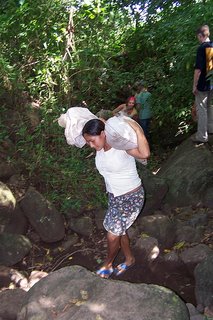 In Nicaragua hebben Nederlanders en Nicaraguanen zich gezamenlijk ingezet voor duurzame ontwikkeling. ‘Het werkt goed als we ons met z’n allen in het zweet werken voor de huizenbouw. Dat is veel gelijkwaardiger dan wanneer wij alleen geld, spullen en kennis komen brengen en zij “dank je wel” moeten zeggen.’
In Nicaragua hebben Nederlanders en Nicaraguanen zich gezamenlijk ingezet voor duurzame ontwikkeling. ‘Het werkt goed als we ons met z’n allen in het zweet werken voor de huizenbouw. Dat is veel gelijkwaardiger dan wanneer wij alleen geld, spullen en kennis komen brengen en zij “dank je wel” moeten zeggen.’
Het was een goede ervaring voor de Nederlandse jongeren te zien hoe zwaar het leven kan zijn op Ometepe. Het is hard werken en je moet je zien te redden met weinig middelen. ‘Ze leren daardoor te relativeren, gaan bewuster leven, vinden alles minder vanzelfsprekend. Als je je samen met anderen in het zweet en de blaren op je handen werkt om voor en met die ander een dak boven zijn of haar hoofd te maken, dan vraag je je ineens af, waarom je je zo opwindt als in Nederland de trein vijf minuten te laat is. Of als de prijs van een biertje weer gestegen is. Er zijn wel belangrijker zaken in de wereld. Jongeren worden geraakt door wat ze meemaken in een ontwikkelingsland. Sommigen willen meer gaan doen voor een betere wereld dan ze tot dan toe deden. Zij gaan voor langere tijd naar het buitenland, of ze doen vrijwilligerswerk in Nederland. Jongeren worden geraakt en voelen zich betrokken, willen zich inzetten. En daar doe ik het allemaal voor. Zoals ik ook geraakt werd toen ik voor het eerst een vrijwilligersproject deed in Senegal.’

